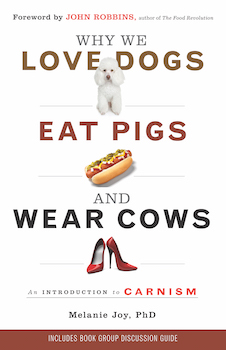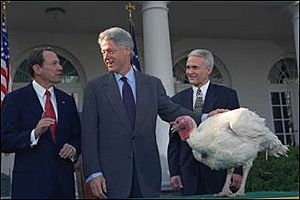Why We Love Dogs, Eat Pigs, and Wear Cows facts for kids
 |
|
| Author | Melanie Joy |
|---|---|
| Country | United States |
| Subject | Food and drink |
| Publisher | Conari Press |
|
Publication date
|
2009 |
| Media type | Print (hardback & paperback) and audiobook |
| Pages | 204 pp. |
| ISBN | 1-573-24461-9 |
| OCLC | 316832932 |
| 641.36 | |
| LC Class | TX371.J69 2010 |
Why We Love Dogs, Eat Pigs, and Wear Cows: An Introduction to Carnism is a book from 2009. It was written by an American social psychologist named Melanie Joy. The book talks about why people eat meat and the ideas behind it. This way of thinking is called "carnism".
Melanie Joy first used the word carnism in 2001. She developed the idea more in her studies in 2003. Carnism is a part of speciesism. This is the idea that one species is more important than others. Carnism is different from ethical veganism. Veganism means choosing not to eat or use any animal products. In 2020, a special anniversary edition of the book came out.
Contents
Understanding Carnism
What is Carnism?
Melanie Joy, who is a social psychologist and writer, noticed something interesting. Words like carnivore were not quite right. A carnivore is an animal that needs to eat meat to live. But people who eat meat choose to do so based on their beliefs.
Joy found there was no word for the beliefs of people who eat meat. So, she created the term carnism. It comes from the Latin word carn, meaning flesh or body. This word helps describe the common way of thinking about eating meat. Joy explains that we often do not name mainstream ideas. We act as if they are just a natural part of life. But eating meat is a choice, and not everyone makes it.
How Carnism Works
Joy says that carnism is a very common but often unseen idea in our culture. It supports the choice to eat meat. Carnism is an invisible system of beliefs. It affects us socially, psychologically, and even physically.
For example, billions of farm animals are killed for meat each year in the United States. But most people never see these animals. They are kept in large farms, hidden from the public. Joy believes that eating meat is not natural. It is influenced by how society teaches us to think. She also says that most people care about animals. They do not want animals to suffer.

Joy explains that humans are born with the ability to feel empathy. This means most people care about animals. They want to stop animals from suffering. Humans also value kindness, fairness, and helping others. But sometimes, what people do does not match these values.
To keep eating animals, Joy says people use "psychic numbing." This means they change how they see their actions towards animals. They use ways to block their feelings of empathy.
First, carnism makes people deny there is a problem with eating animals. Second, it says eating meat is normal, natural, and needed. Third, to avoid feeling confused or guilty, carnism changes how we see animals. They become food objects or categories, not living beings. People who believe these things are called carnists.
Through these ways of denying, justifying, and changing how we see things, carnism makes people go against their own values. Some experts say that the government and media help make these ideas about eating meat seem right.
Book's Impact
Journalist Avery Yale Kamila reviewed Joy's book in 2020. She said it has been very important. It has changed how people think about animals. Kamila wrote that the book was listed as one of the top books of the 2010s by Vox. Melanie Joy also talked about her book with The Washington Post. A winning essay in The New York Times Student Editorial Contest also mentioned the book.
Different Editions
The book has been translated into many languages. These include Hebrew, Hungarian, Italian, Korean, French, Chinese, Swedish, Danish, Croatian, Spanish, German, Portuguese, and Dutch.
A special 10th anniversary edition came out in 2020. It has a new introduction written by Yuval Noah Harari.
See also
 | Jessica Watkins |
 | Robert Henry Lawrence Jr. |
 | Mae Jemison |
 | Sian Proctor |
 | Guion Bluford |


 In Spanish:
In Spanish: